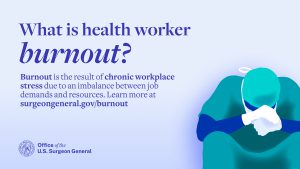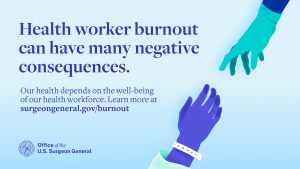Health Worker Mental Health Initiative
Posted on by A new Surgeon General’s Advisory highlights the urgent need to address the health worker burnout crisis across the country. Workers providing health services face many on-the-job challenges that can lead to work-related stress. For many of the 20 million health workers in the U.S., the COVID-19 pandemic has led to new and worsening mental health concerns, including burnout, compassion fatigue, depression, anxiety, substance use disorders, and suicidal ideation. These concerns affect each worker’s overall health, job performance, and ultimately, patient care and safety.
A new Surgeon General’s Advisory highlights the urgent need to address the health worker burnout crisis across the country. Workers providing health services face many on-the-job challenges that can lead to work-related stress. For many of the 20 million health workers in the U.S., the COVID-19 pandemic has led to new and worsening mental health concerns, including burnout, compassion fatigue, depression, anxiety, substance use disorders, and suicidal ideation. These concerns affect each worker’s overall health, job performance, and ultimately, patient care and safety.
In November 2021, the Centers for Disease Control and Prevention (CDC) and the National Institute for Occupational Safety and Health (NIOSH) launched the Health Worker Mental Health Initiative. The health workforce is composed of a wide variety of occupations – including providers such as registered nurses, physicians, and dentists, as well as individuals in critical and essential support roles, such as community health workers, direct support professionals, and caregivers.[1]
The challenges historically faced by health workers have been intensified by the COVID-19 pandemic including difficult working conditions, long hours of work, high levels of exposure to human suffering and death, and increased risks for personal exposure and harm. These challenges have taken a toll on our healthcare workers.
- 93% of healthcare workers experienced stress from June through September 2020.[2]
- 22% of healthcare workers reported mild depression, anxiety, and PTSD (data from 65 studies involving 97,333 healthcare workers in 21 countries). [3]
- 32% of nurses reported potentially leaving their positions. [4]
- 69% of physicians reported depression in the fall of 2020.[5]
- 13% of physicians reported thoughts of suicide. [5]
- 53% of the 26,174 public health workers surveyed reported symptoms of at least one mental health condition in the past 2 weeks.[6]
As part of the American Rescue Plan, NIOSH received funding to deliver a national mental health education and awareness campaign that will target employers and workers in the nation’s healthcare sector, first responder EMTs, and public health workers.
The campaign will raise awareness of mental health issues and suicide risk among health workers and their employers. The initiative focuses on five main objectives including:
- Understanding Burden: Spotlight the personal, social, and economic burden of poor mental health outcomes
- Assimilating Evidence: Develop repository of best practices, resources, and interventions
- Partnering for Impact: Inspire, amplify, and support partnership efforts
- Identifying or Adapting Tools: Improve data, screening tools, trainings, resources, and policies for sustainable change
- Generating Awareness: Conduct national, multi-dimensional social marketing campaign to get the word out, lower stigma, normalize the conversation around mental health, lower barriers for care-seeking, and bring a positive message that people can get better.
On November 18, 2021, NIOSH Director Dr. John Howard, Surgeon General Dr. Vivek Murthy, and other national experts from labor and medicine launched the campaign with the webinar Protecting Health Worker Mental Health: A Call-to-Action.
We are currently analyzing information collected on existing occupational safety and health interventions, services, and research in progress that focus on approaches to prevent stress and improve the mental health and well-being of health workers. This is the first step in developing a repository of best practices, resources, and interventions as discussed above.
 The Health Worker Mental Health Initiative builds on several research programs at NIOSH, including the Total Worker Health® (TWH) program. TWH focuses on the overall health and well-being of workers specifically looking at the connection between work, safety and overall health and well-being. In September 2021 NIOSH launched the Johns Hopkins Psychosocial, Organizational, and Environmental (P.O.E.) Total Worker Health® Center in Mental Health. This Center joins nine other funded academic centers researching the most effective ways to improve the overall well-being of workers.
The Health Worker Mental Health Initiative builds on several research programs at NIOSH, including the Total Worker Health® (TWH) program. TWH focuses on the overall health and well-being of workers specifically looking at the connection between work, safety and overall health and well-being. In September 2021 NIOSH launched the Johns Hopkins Psychosocial, Organizational, and Environmental (P.O.E.) Total Worker Health® Center in Mental Health. This Center joins nine other funded academic centers researching the most effective ways to improve the overall well-being of workers.
As the healthcare industry faces a multitude of crises, the Health Worker Mental Health Initiative will help to improve the mental health of the vital health workforce. In the end, a healthier health worker means healthier patients and communities.
For more information on healthcare worker safety and health see the NIOSH website.
Tom Cunningham, PhD, is a Senior Scientist in the NIOSH Division of Science Integration.
L. Casey Chosewood, MD, MPH, is the Director of the NIOSH Office for Total Worker Health®.
Jennifer Tyrawski, PhD, is a Health Communications Specialist in the NIOSH Division of Field Studies and Engineering.
References
[1] U.S. Department of Health and Human Services [2021] HHS Health Workforce Strategic Plan https://bhw.hrsa.gov/sites/default/files/bureau-health-workforce/about-us/hhs-health-workforce-strategic-plan-2021.pdf.
[2] MHA [2021]. The Mental Health of Healthcare Workers in COVID-19
[3] Li Y, et al. [2021]. Prevalence of depression, anxiety and post-traumatic stress disorder in health care workers during the COVID-19 pandemic: A systematic review and meta-analysis.
[4] McKinsey &Company (2022). Surveyed nurses consider leaving direct patient care at elevated rates.
[5] NIHCM (2021). Physician Burnout & Moral Injury: The Hidden Health Care Crisis
[6] MMWR [2021]. Symptoms of Depression, Anxiety, Post-Traumatic Stress Disorder, and Suicidal Ideation Among State, Tribal, Local, and Territorial Public Health Workers During the COVID-19 Pandemic—United States, March-April 2021
Posted on by

